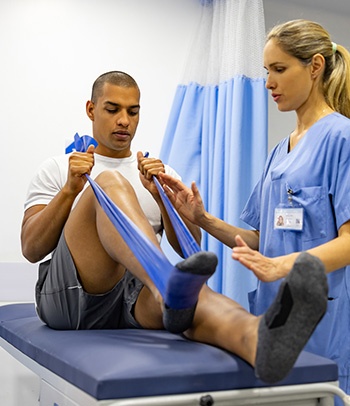No matter what your recovery looks like, you can take steps to ensure you’re doing everything you can to heal properly and get your health back on track.
Having surgery can take a lot out of you, and the recovery process can be challenging, too. How difficult your recovery may be depends on the type of surgery and your overall health, but no matter your recovery you can take steps to ensure you’re doing everything to heal properly and get your health back on track.
Read these tips for a successful recovery and learn more about potential complications from surgery, and explore available resources to support you during this challenging time.
Tips for Before and After Surgery
Your surgical team will provide you with specific instructions to prepare for your surgery and recovery. In addition, check out these tips collected from several health care sources:
- Learn as much as you can. Before you get surgery, learn as much as you can about it. What is normal and what isn’t? How much pain should I expect? How long will it take to return to certain activities? Consider writing down a list of questions so you don’t forget to ask anything.
- Put a support system in place. Don’t assume you’ll be able to handle surgery recovery by yourself. Put a support system in place to help you through the most difficult days. Ask family, friends or neighbors to help out with tasks like driving, cooking and child care. If you don’t have support nearby, consider some of the resources listed further below.
- Prepare your space. Depending on your type of surgery, you may need to make some changes to your living space. Are there things you need to easily reach necessary items and, such as food and water? Do you need to clear paths to the restroom and kitchen? Can you set up an area for most of what you’ll need for the first few days?
- Follow your surgeon’s instructions. For a successful recovery, you have to follow instructions. You may be instructed not to shower or lift anything above a certain weight to protect your stitches and prevent bleeding, but if you’ve received instructions there’s a reason. Your successful recovery depends on listening to what you’ve been told to do.
- Learn more about options for managing pain. Pain medication and pain management are often a part of surgery recovery. Explore options with your surgical team about what strategy may work best for you. Some people may want to avoid opioids, for example. Pain is easier to treat before it comes on rather than after the pain is there. Discuss with your surgical team ideas such as taking medication pre-surgery or using a steroid or over-the-counter meds instead.
- Don’t make your own medical decisions. You may be tempted to make decisions on your own while recovering, but it’s important to keep your follow-up appointments and talk to your surgical team first. For example, it can be dangerous to stop taking certain medications without consulting your medical providers first.

- Stay active. With your surgical team’s approval, getting up and moving around safely and every few hours can help reduce inflammation, prevent blood clots, and help stop muscle atrophy. What exercises does your team want you to do to stay active safely while recovering?
- Take care of yourself. In the midst of a painful recovery, it can be easy to forget to take care of yourself, but it’s important. Follow successful surgery and recovery tips such as staying hydrated and eat a healthy diet full of protein and vitamin-rich foods to help promote healing and minimize complications.
- Track your medications. You may be taking several different medications while recovering and it can be easy to get them confused. There are several helpful online tools you can use to keep track of your medications.
- Know when to get help. Make sure you’re clear on when you should call for help or go for emergency care. Conditions such as excessive bleeding, having difficulty breathing, or ongoing nausea could all be signs of complications after surgery.
Things to Watch for After Surgery
Your surgical team will go over certain complications to watch out for, but here are some to keep in mind:
- Infection – To avoid infection, keep your hands clean and learn how to care for your wound properly. Signs of infection may include bleeding; drainage that is foul-smelling, thick or yellow; increased redness, pain or swelling; or fever.
- Bleeding – Be sure you know how much bleeding can be expected. If you see much more blood, get help immediately.
- Allergic reactions – If this is your first surgery, you may not know how you’ll react to anesthesia or certain medications. Be sure you know what you can expect with the medications you’ve been prescribed. Allergy to medications may show up as itchiness, rash, swelling, trouble swallowing or breathing, cough, or light-headedness. Call 911, if the symptoms are progressing or severe, and contact your team, if your symptoms are mild.
- Addiction to pain medication – Your recovery will involve some aspect of pain management. If your surgical team prescribes opioid medication, it should only be for a short amount of time. Be sure your surgical team explains the effects of opioid medications and potential risk for addiction.
- Blood clot – Deep vein thrombosis is a major risk after surgery, and can lead to life-threatening pulmonary embolism or stroke. Your surgical team will outline a program to help prevent the development of blood clots, including elevating your leg, walking about, taking blood thinners, using compression stockings and more.
Surgery Recovery Resources
- Your employer – Check to see what your employer offers in terms of short-term disability. Sometimes you’re able to get a portion of your salary covered for up to six weeks. Talk to your human resources department to learn more.
- Taking Care of Yourself: A Guide for When I Leave the Hospital – This guide is a great resource for patients before and after surgery. It has blank forms to help you keep track of medications, questions you have, exercises you should do, upcoming appointments and much more.
- The Department of Veterans Affairs (VA) –
- If you’re enrolled in VA health care, your medical benefits package includes a wide range of services, including traditional hospital-based services such as surgery, as well as important recovery pieces like pharmacy and physical therapy.
- If you’re recovering from a surgery related to your military service and you meet certain requirements, you may be able to get a temporary 100% disability rating and added compensation while you recover. Learn more about eligibility requirements and how to file a claim.
- Depending on the type of support you need while you recover, explore the following options: VA Community Living Centers (VA Nursing Homes), Home Health Care Services, Rehabilitation Services, and more.
- Veterans Transportation Service – If you need access to safe, reliable transportation to and from your appointments, check out VA’s free transportation service from participating VA medical centers.
Make your surgery recovery as successful as possible. Follow these helpful tips and explore these resources to know where to reach out for the support you deserve!







